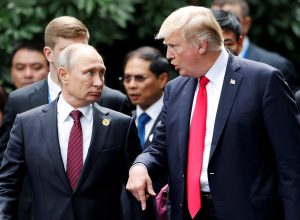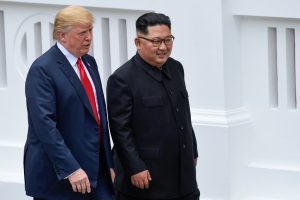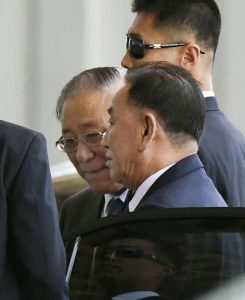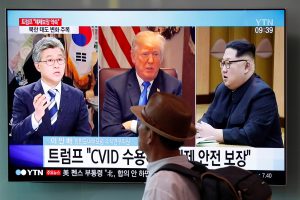
By Steve Holland, Soyoung Kim and Jack Kim
SINGAPORE (Reuters) – U.S. President Donald Trump said North Korean leader Kim Jong Un pledged at a historic summit on Tuesday to move toward complete denuclearization, while the United States promised its old foe security guarantees.
The start of negotiations aimed at banishing what Trump described as North Korea’s “very substantial” nuclear arsenal could have far-reaching ramifications for the region, and in one of the biggest surprises of the day, Trump said he would stop military exercises with old ally South Korea.
But Trump and Kim gave few other specifics in a joint statement signed at the end of their summit in Singapore, and several analysts cast doubt on how effective the agreement would prove to be in the long run at getting North Korea to give up its cherished nuclear weapons.
“President Trump committed to provide security guarantees to the DPRK and Chairman Kim Jong Un reaffirmed his firm and unwavering commitment to complete denuclearization of the Korean Peninsula,” the statement said, referring to North Korea by the initials of its official name, the Democratic People’s Republic of Korea.
The two leaders had appeared cautious and serious when they arrived for the summit at the Capella hotel on Singapore’s Sentosa, a resort island with luxury hotels, a casino and a Universal Studios theme park.
Body language expert said they both tried to project command as they met, but also displayed signs of nerves.
After a handshake, they were soon smiling and holding each other by the arm, before Trump guided Kim to a library where they met with only their interpreters. Trump had said on Saturday he would know within a minute of meeting Kim whether he would reach a deal.
Trump later told a news conference he expected the denuclearization process to start “very, very quickly” and it would be verified by “having a lot of people in North Korea”.
U.S. Secretary of State Mike Pompeo and North Korean officials would hold follow-up negotiations “at the earliest possible date”, the statement said.
Despite Kim announcing that North Korea was destroying a major missile engine-testing site, Trump said sanctions on North Korea would stay in place for now.
John Hopkins University’s North Korea monitoring project 38 North said last week North Korea had razed a facility for testing canister-based ballistic missiles.
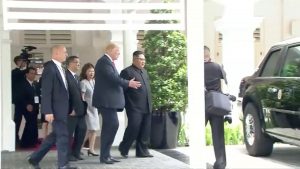
U.S. President Donald Trump shows North Korean leader Kim Jong Un his car, nicknamed “The Beast”, during their walk around Capella hotel after a working lunch at a summit in Singapore, June 12, 2018, in this still image taken from video. Host Broadcaster/via REUTERS ATTENTION EDITORS – THIS IMAGE WAS PROVIDED BY A THIRD PARTY. NO RESALES. NO ARCHIVES. BROADCASTERS: NO USE AFTER 72 HOURS; DIGITAL: NO USE AFTER 30 DAYS.
Trump said the regular military exercises the United States holds with South Korea were expensive and provocative. His halting of the drills could rattle South Korea and Japan, which rely on a U.S. security umbrella.
Trump said the exercises would not be revived “unless and until we see the future negotiation is not going along like it should”.
Earlier, Kim said he and Trump had “decided to leave the past behind. The world will see a major change”.
However, several experts said the summit failed to secure any concrete commitments by Pyongyang for dismantling its nuclear arsenal. They also noted the statement did not refer to human rights in one of the world’s most repressive nations.
TRADING FOR A PROMISE
Anthony Ruggiero, senior fellow at Washington’s Foundation for Defense of Democracies think-tank, said it was unclear if negotiations would lead to denuclearization, or end with broken promises, as had happened in the past.
“This looks like a restatement of where we left negotiations more than 10 years ago and not a major step forward,” he said.
Daniel Russel, formerly the State Department’s top Asia diplomat, said the absence of any reference to the North’s ballistic missiles was “glaring”.
“Trading our defense of South Korea for a promise is a lopsided deal that past presidents could have made but passed on,” he said.
North Korea has long rejected unilateral nuclear disarmament, instead referring to the denuclearization of the peninsula. That has always been interpreted as a call for the United States to remove its “nuclear umbrella” protecting South Korea and Japan.
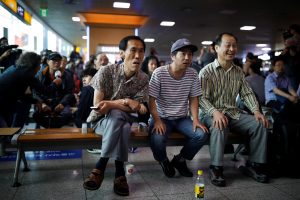
People watch a TV broadcasting a news report on summit between the U.S. and North Korea, in Seoul, South Korea, June 12, 2018. REUTERS/Kim Hong-Ji
The document made no mention of the sanctions on North Korea and nor was there any reference to a peace treaty formally ending the 1950-53 Korean War, which killed millions of people and ended in a truce.
But the joint statement did say the two sides had agreed to recover the remains of prisoners of war and soldiers missing in action, so they could be repatriated.
Trump said China, North Korea’s main ally, would welcome the progress he and Kim had had made.
“Making a deal is great thing for the world. It’s also a great thing for China,” he said.
China, which has opposed North Korea’s nuclear ambitions, said it hoped North Korea and the United States could reach a basic consensus on denuclearization.
“At the same time, there needs to be a peace mechanism for the peninsula to resolve North Korea’s reasonable security concerns,” China’s top diplomat, state councillor Wang Yi, told reporters in Beijing.
Russia’s Deputy Foreign Minister Sergei Ryabkov said the Kremlin had a positive assessment of the summit but “the devil is in the details”, the TASS news agency reported.
If the summit does lead to a lasting detente, it could fundamentally change the security landscape of Northeast Asia, just as former U.S. President Richard Nixon’s visit to China in 1972 led to the transformation of China.
But Li Nan, senior researcher at Pangoal, a Beijing-based Chinese public policy think-tank, said the meeting had only symbolic significance.
“There is no concrete detail on the denuclearization of the Korean peninsula and the provision of security guarantees by the United States,” Li said. “It is too early to call it a turning point in North Korea-U.S. relations.”
The dollar retreated after jumping to a 3-week high but global shares crept higher on news of the agreement.
Graphic: https://tmsnrt.rs/2l2UwW7
HARD NEGOTIATOR
Trump said he had formed a “very special bond” with Kim and relations with North Korea would be very different in future. He called Kim “very smart” and a “very worthy, very hard negotiator”.
Just a few months ago, Kim was an international pariah accused of ordering the killing of his uncle, a half-brother and hundreds of officials suspected of disloyalty. Tens of thousands of North Koreans are imprisoned in labor camps.
Trump said he raised the issue of human rights with Kim, and he believed the North Korean leader wanted to “do the right thing”.
Trump also said U.S. college student Otto Warmbier did not die in vain days after he was released from North Korean custody in 2017, as his death helped initiate the process that led to the summit.
“I believe it’s a rough situation over there, there’s no question about it, and we did discuss it today pretty strongly … at pretty good length, and we’ll be doing something on it,” Trump said.
During a post-lunch stroll through the gardens of the hotel where the summit was held, Trump said the meeting had gone “better than anybody could have expected”.
Kim stood silently alongside, but he had earlier described the summit as a “a good prelude to peace”.
Trump also rolled out what amounted to a promotional video starring the two leaders before the talks, which was watched by the North Korean officials on an iPad.
As the two leaders met, Singapore navy vessels, and air force Apache helicopters patrolled, while fighter jets and a Gulfstream 550 early warning aircraft circled high overhead.
Within North Korea, the summit is likely to go down well.
“Signing the joint statement would show North Korean citizens that Kim Jong Un is not a leader just within North Korea but also in international society, especially with his position equivalent to Trump,” said Ahn Chan-il, a defector from North Korea who lives in the South.
(Additional reporting by Dewey Sim, Aradhana Aravindan, Himani Sarkar, Miral Fahmy, John Geddie, Joyce Lee, Grace Lee, Matt Spetalnick and David Brunnstrom in Singapore and Christine Kim in Seoul; Editing by Raju Gopalakrishnan, Robert Birsel)

